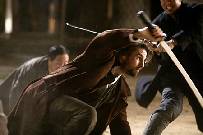|
|
||||
|
|
by John P. McCarthy  As a U.S. Army captain in nineteenth-century Japan, Tom Cruise models battle regalia and a kimono in The Last Samurai, a handsome historical saga combining violent warfare and Eastern spirituality. Director Edward Zwick embarks on a fascinating trip but can't stop staring at Cruise. Chalk this up to Hollywood narcissism and, indirectly, to a mild case of Orientalism -- a condescending Western attitude toward Asian culture. The film's impressive story about shame and honor is beautifully told. Tranquil scenes depicting the hero's cultural immersion alternate with impeccably gory battles and crackling martial arts demos. Yet certain stretches are overly deliberate even static, as Zwick mimics Zen states by going very slowly. He holds shots, especially close-ups, for many more beats than necessary, making The Last Samurai longer than it ought to be. Disillusioned from having ruthlessly tamed the American frontier, the alcoholic Captain Nathan Algren is hawking Winchester rifles in San Francisco when he's hired to train the Japanese Emperor's soldiers and help suppress a Samurai rebellion. Feudal Japan is torn between tradition and so-called progress. Outside influences are applying pressure, and the weak young Emperor cannot control unscrupulous forces of modernization within the country. Revolt is the Samurai's only alternative. In the movie's ultimate battle, their swords, archers, and strict code of honor are no match for imported Howitzers and machine guns. Algren switches sides well before that, having been captured during a skirmish and schooled in the Samurai way of life in an idyllic mountain village. Nursed back to health by a beautiful woman whose husband he has killed, he cleanses his soul under the tutelage of the Samurai leader Katsumodo (Ken Watanabe). The filmmakers aren't primarily interested in delving into the complexities of Japanese history or unwrapping the secrets of the Orient. By stressing parallels between 1870s Japan and atrocities in America's short history, the multi-credited screenplay is guilty of ethnocentricism. Algren's flashbacks to his unit's massacre of innocent Indians have little connection to the struggle inside Japan. True, they signify Algren's loss of honor as a military man, but the implication is that Japanese history is only useful to the extent it reflects America's own transgressions. This trivializes the Samurai dilemma and puts undue emphasis on the white visitor. But, hey, he is Tom Cruise. And the pupil makes noble use of the wisdom that Katsumoto dispenses in neat epigrams. The violent battles and crisp fight choreography -- preferable to the Hong Kong chop-socky style that has creeped into mainstream American flicks -- are reminiscent of Akira Kurosawa's great films. But again, this is an outsider's story and The Last Samuria has more in common with Dances with Wolves than with Seven Samurai. Cruise's performance can't fairly be faulted and the balance of the acting is terrific. Timothy Spall plays a British ex-pat who serves as guide and chronicler; Tony Goldwyn is the American villain. Koyuki, the actress portraying Algren's love interest, looks absolutely gorgeous. Because their love is never consummated, this excellent bit of restraint gives the movie a deep sense of longing and its most authentically Japanese quality. Although Algren finds peace, it's impossible for viewers to share that feeling watching so violent a movie, perhaps another reason Zwick belabors the peaceful interludes. (Released by Warner Bros. and rated "R" for strong violence and battle sequences.)
|
||
|
© 2025 - ReelTalk Movie Reviews Website designed by Dot Pitch Studios, LLC |



